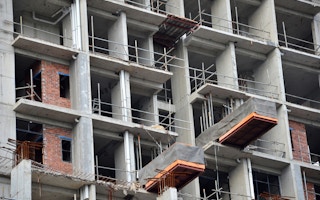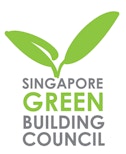When solar thermal air conditioner manufacturer Ecoline Solar was attempting to break into the competitive air conditioning market, it boasted a seal of approval that made all the difference.
The green tick it got from the Singapore Green Building Council’s (SGBC) product certification scheme in June helped the company win over customers with its proven eco-friendly qualities. Their green building technology harnesses solar energy to save electricity.
Certifying their product has helped the company attract the attention of customers and delivered a boost to the company’s bottom line, says business development director of the home-grown company, Liam Kok Aeng.
He adds that being a member has also helped increase the company’s visibility. For example, the council provided prominent booths for members to display their green building products at the recently-held Build Eco Expo (BEX) Asia trade show in Singapore, which attracted almost 10,000 visitors.
Liam says the company has clinched several new projects in Singapore and the region since then, and are exploring new deals with many customers from the event. “Potential clients now approach us, not the other way around,” he adds.
Ecoline Solar is one example of how SGBC seeks to help member companies bring their products to market. The council’s other priority is certifying products and services that meet the highest sustainability standards.
Its membership model, where architects, engineers, product manufacturers and real estate developers are all participating members of the council, is a key element to achieving these objectives, says SGBC’s honorary advisor Lee Siew Eang.
He explains that the key to sustainable buildings is to foster collaboration between industry members at all stages of the construction process. Under the SGBC umbrella, product manufacturers can make the benefits of their certified items easily known to architects, engineers, and developers who are also council members, which helps get sustainable products factored into building design and construction.
Products eligible for certification under the Singapore Green Building Product (SGBP) scheme, which was first launched in 2010, span across 17 broad categories including concrete, glazing, interior and exterior wall and floor finishes, mechanical and electrical equipment.
Each item is analysed for its overall environmental impact in five key areas, including energy and water use, resource efficiency, health-related impact, and pollution control.
Products that meet the criteria – there are almost 700 certified under the SGBP to date — are then rated on a spectrum ranging from ‘good’ to ‘leader’, based on a set of criteria drawn up.
The varying ratings for each product help a construction project earn a varying number of points for the Green Mark building certification, administered by Singapore’s Building and Construction Authority (BCA), which rates the environmental performance of buildings.
A product certification scheme with a difference
“
Members of the industry know these concerns and limitations best, and have a clear sense of which sustainability targets are meaningful, realistic and achievable. Letting the industry decide its sustainability priorities ensures that the scheme is relevant and useful to the region’s building industry at all times.
Yvonne Soh, general manager, Singapore Green Building Council
Lee says that the Council’s evaluation scheme is one of the “most comprehensive ones around”.
“We look at a product’s entire lifecycle using a holistic set of criteria that evaluate its total environmental impact,” he adds.
Ng Eng Kiong, SGBC president, notes that unlike in many countries, where certification schemes are usually the territory of private business entities set up for profit, the SGBC’s fundamental objective is to promote sustainability within the industry rather than pursue profit.
Yvonne Soh, SGBC’s general manager adds that the complementary relationship between the SGBP certification scheme and BCA’s Green Mark is a unique arrangement that has received global attention.
What also works in the scheme’s favour is its self-regulating nature. SGBC’s members - most of whom come from engineering and architecture firms, construction companies, and manufacturers - voluntarily serve on committees that determine the certification criteria for each product.
SGBC says it is an effective system since it allows industry members to balance sustainability aspirations with workable short-term targets.
SGBC’s Soh explains: “There are certain baseline standards for product quality and safety that are legislated and that everyone has to adhere to. But when it comes to sustainability, the degree of commitment from companies varies greatly according to the local context and market trends.”
For example, while energy efficiency is a high priority in resource-scarce Singapore and many companies are ready to invest heavily in products and technologies that achieve this, other sustainability practices such as incorporating recycled materials into buildings might be seen as too costly or inconvenient.
“Members of the industry know these concerns and limitations best, and have a clear sense of which sustainability targets are meaningful, realistic and achievable,” says Soh. Letting the industry decide its sustainability priorities ensures that the scheme is relevant and useful to the region’s building industry, she adds.
Involving members in setting the criteria also makes the scheme agile, as they can provide feedback when a criterion needs to be revised or raised to a higher standard, Soh observes.
To ensure that self-regulation does not compromise on how stringent or credible the scheme is, each committee is headed by an industry leader from an engineering or architecture firm, overseen by a technical coordinator from the SGBC board of directors, and the SGBC board.
These committees meet regularly with SGBC members with products seeking certification, and factor in their concerns and priorities on which aspects of each product’s life cycle should be assessed by the scheme.
Once the criteriais identified, the requirements for each product is benchmarked against credible local and international sustainability standards, including but not limited to Singapore Standards (SS), International Standards Organisation (ISO), and other Standards or requirements that are related to the specific product.
Setting the SGBP against such a broad set of global sustainability standards also helps ensure that products meet a holistic and rigorous set of expectations, says Soh.
Additionally, any certification score that gives a product the top rating of ‘Leader’ has to be approved by the SGBC board to ensure that high scores are not awarded lightly.
Tan Tian Chong, SGBC’s second vice president, says BCA’s reliance on the scheme to determine the sustainability credentials of construction materials in helping buildings achieve the Green Mark rating is a reminder that the scheme’s criteria has a nationwide impact on the building sector.
Ultimately, that relationship motivates SGBC to ensure that certifying sustainable green products remains a rigorous and authoritative process, says Tan Tian Chong, SGBC’s second vice president.
“The SGBP certification scheme sends a very clear message to manufacturers and distributors that there are very high environmental standards for products used in buildings here,” says Soh.
“The scheme not only helps makes buildings more sustainable, we have also raised the bar on overall building practices in Singapore,” she adds.
For more information on SGBC, visit http://sgbc.sg.
For more information on SGBC’s Singapore Green Products Certification Scheme, visit http://sgbc.sg/green-certifications/product-certification/




















